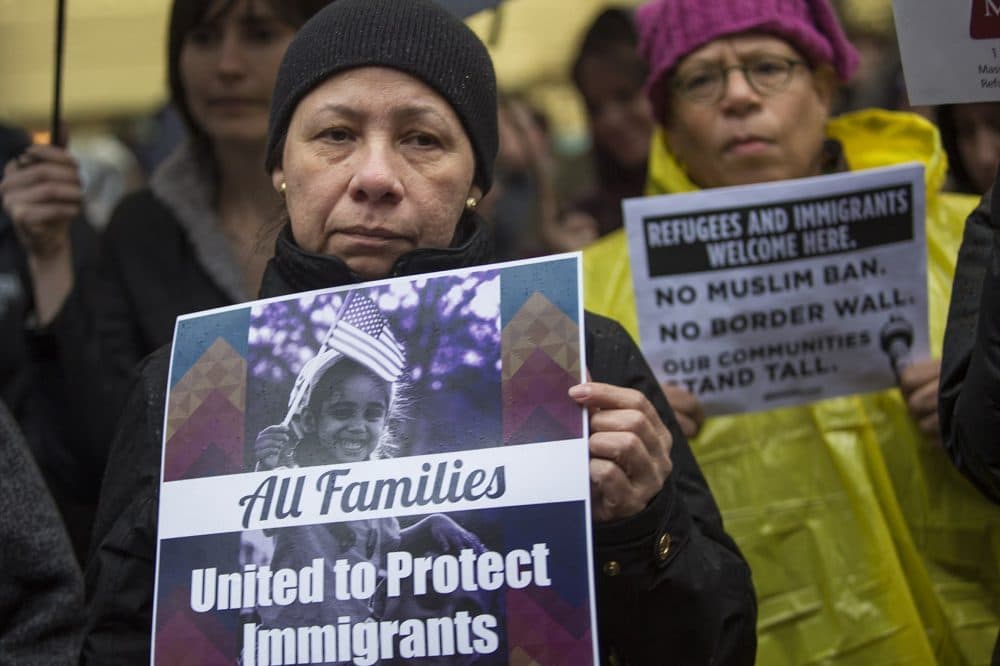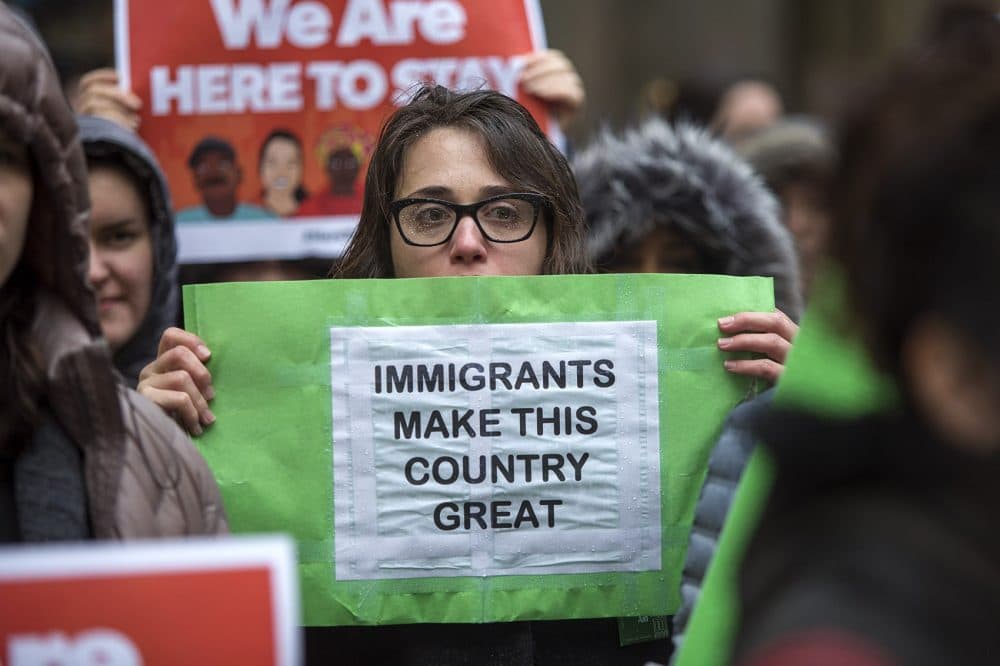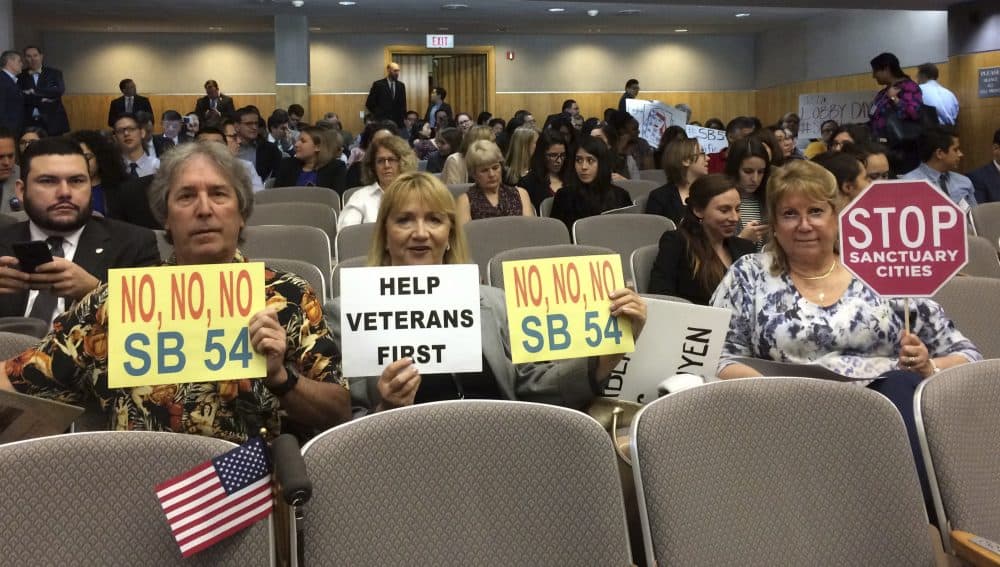Advertisement
To Push Against Trump's Immigration Policies, More Communities Adopt 'Sanctuary City' Status

While the president's executive orders on immigration play out in federal court, more and more Massachusetts communities are designing their own immigration policies.
The question of whether to adopt so-called "sanctuary city" status is trending across the state, from Hull to Amherst to Revere. More than a half-dozen towns and cities have already voted on the matter since President Trump's election.
But what does becoming a sanctuary city actually mean?
Well, it's not an official legal term, so the definition is sort of up for interpretation. There's a patchwork of policies throughout the state. For instance, there are "welcoming cities," like Newton, which just passed an ordinance in February. There are also sanctuary cities, like Somerville, and cities with trust acts, like Boston.
Some of the policies have more teeth behind them than others, but what they all have in common is that local police in these communities won't ask about an individual's immigration status and may not fully cooperate with federal immigration officials.
New Activists Seek To 'Take A Stand'
"Once the new administration took office, we saw this trend where a lot of cities and towns wanted to get in on the action, wanted to pass really good, protective policies," said Laura Rótolo, staff counsel at the American Civil Liberties Union of Massachusetts.
She says the chapter has always had resources for people interested in establishing policies in their towns. But recently, interest in becoming a sanctuary city has soared.
"So we decided to put all of our knowledge into one place and create a toolkit," she explained.
Now, the sanctuary city toolkit lives online. Rótolo says people in Massachusetts, including elected officials, activists and individual residents are using it.
"We're seeing new activists who just want to take a stand against the Trump administration's immigration policies, who want to do something for the immigrants in their community, whereas they may no have really thought of it before," she said. "So we're seeing newly mobilized individuals."
Advertisement

'Sanctuary City' Debate In Arlington
Judy Weinberg has lived in Arlington for more than 30 years. "The election threw me for a loop," she said.
Weinberg considers herself politically active, having campaigned for candidates in the past. But she says embarking on this latest mission to make Arlington a sanctuary community is the first time she's really taken the lead on a project.
"I'd heard about the sanctuary cities. I know Somerville and Boston are both very aggressively proud of that, so I said, 'How about if Arlington does it?' And everybody's like, 'Yeah! You should do it.' And I was like, 'OK.' "
Weinberg brought the idea to Arlington's Human Rights Commission, and earlier this month the Arlington Town Meeting voted on a Trust Act resolution. The resolution wasn't a new ordinance, but really more of a statement.
Ninety percent of the town meeting members backed the resolution. But there was some discord. Town representative Joe Monju spoke at the meeting and expressed a common concern among those who oppose sanctuary communities.
"A headline from January 2016 informs us that multiple MS-13 members with ties to murders and drug trafficking are arrested in Somerville. Is offering sanctuary to murderous MS-13 gang members in the best interest of the town?" he said.

Joe Curro, chairman of the Arlington Board of Selectmen, presented the case in favor of adopting the resolution.
"Like it or not, we're taking part in a much broader national debate. At the end of the day, town meeting is being asked to express an opinion. An opinion in support of fair and impartial treatment of all the individuals whom we serve," he said.
Sanctuary City Debate Likely To Rage On
For months now, this debate has been playing out in auditoriums and town halls across the state.
"We're reaching a tipping point where many people see that a stand has to be taken against this sort of enforcement, and there is a long tradition in Massachusetts of standing up."
Daniel Kanstroom, Boston College law professor
Issuing several sweeping executive orders on immigration were among President Trump's first actions in the Oval Office. He proposed a travel ban for people from some predominantly Muslim countries, and he threatened to pull federal funding from sanctuary cities. Both of those orders have been blocked — at least temporarily — by federal judges, but they are sparking conversations about the role local and state governments can play in immigration.
Daniel Kanstroom, a law professor at Boston College, says the sanctuary city movement in Massachusetts reflects a big picture shift in activism, from a national stage to a focus on what can be done locally.
"I think we're reaching a tipping point where many people see that a stand has to be taken against this sort of enforcement, and there is a long tradition in Massachusetts of standing up," he said.
There will likely be more individuals in more towns and cities across the state standing up to debate sanctuary city status. According to the ACLU of Massachusetts, there are dozens more communities in the pipeline ready to put it to a vote.
This segment aired on May 22, 2017.
